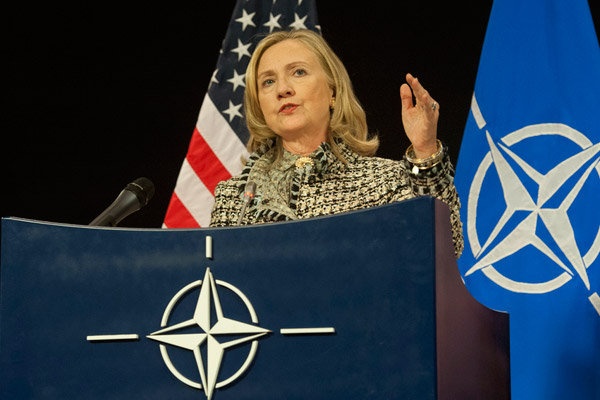
NATO: though the local focus is on protesters, the streets, and their closures, it's not just a protest magnet and a way for cities to signal to the international business community, "hey, we're worldly." And despite the biennial spate of "Whither NATO" stories, international politics of importance does get transacted there. Chief among them at this weekend's conference, as U.S. NATO ambassador Ivo Daalder explained at the Chicago Council of Global Affairs, is passing responsibility in Afghanistan from the U.S. to NATO to Afghan security forces as a way of winding down international involvement:
During this entire transition period, however, until the end of 2014, NATO’s forces, including American forces, will continue to be fully combat ready and will conduct combat operations as needed and as required. Now when President Obama last June announced that he would host the NATO summit in this wonderful town this May, he said that at the summit leaders would define the next phase of transition. And in the lead-up to the summit in 80 days, we are engaged in active consultations and close coordination with our ISAF and Afghan partners about how a shift in mission can occur most effectively within the Lisbon framework.
Ultimately, any final decision on transition and how that next phase will be implemented will be made by President Obama and his fellow leaders here in Chicago on May 21st.
It's a lot of work, as NATO Watch describes in its primer on the Afghan War agenda:
NATO needs to determine how to organize and coordinate the logistically complex withdrawal of 130,000 troops and 70,000 vehicles and containers with equipment out of the landlocked country. NATO is looking to Russia to help manage the logistics and Moscow has offered Ulyanovsk's Vostochny airport as a hub. The need for a Russian transit hub has gained added impetus following the closure of the NATO transit route through Pakistan.
Pakistan, right now, is angry with the U.S. and NATO because of drone strikes:
Undeterred by Islamabad's shrill protests about breach of its sovereignty by American drone strikes culminating in a parliamentary resolution calling for a halt to such unmanned attacks, the US conducted yet another such operation over the weekend. The attack has virtually torpedoed Pakistan's participation in Nato's 25th summit in President Obama's hometown in Chicago on May 20-21 where far reaching decision are expected on the transition in Afghanistan and beyond.
So NATO said that Pakistan shouldn't bother coming until the transit route reopens. Yesterday, Pakistan said, ok, we made our point, and now president Asif Ali Zardari is Chicago-bound. Much of this year's summit will be a sequel to the 2010 Lisbon summit, figuring out how to bring the Afghan War to a close. After that, it's Whither NATO again.
Meanwhile, Russia—through which we'll exit if Pakistan closes its borders—is angry with NATO because it claims NATO's missile-defense system conflicts with Russia's own missile-defense system. It's like the Cold War, only in reverse.
Washington says the missile defense system, due to be completed in four phases by about 2020 and including interceptor missiles based in Poland and Romania, is meant to counter a potential threat from Iran and presents no risk to Russia.
But a mistrustful Moscow says the West will gain the ability to shoot down Russian intercontinental ballistic missiles (ICBMs) in a few years, weakening Russia's nuclear deterrent.
Russia offered to help run the missile shield, which was rejected, so the Russian defense minister offered to blow it up. This is part of why NATO exists: the idea that it's better to have a place to talk about these things other than red phones. Answering the prompt "NATO today is…" Clara Marina O'Donnell told Foreign Policy that it's
Made up of countries whose warring triggered the largest bloodshed in history only 70 years ago. But for over six decades these former enemies have had their militaries working side by side, as friends. And for all the alliance's shortcomings, this is no mean feat.
Or as a friend put it, "Wait, people are against NATO now? It's designed to prevent the Germans from [redacted-ing] Europe again, people."
Here's Ivo Daalder talking shop:
Photograph: U.S. Secretary of Defense


